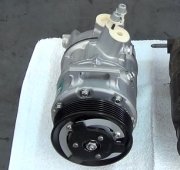Some AC compressors are a "variable displacement" design which means it adjusts automatically to pump just enough refrigerant to meet the cooling demand, and no more. That allows it to run continuously rather than making the irritating thump-on, thump-off while still reducing the drain on fuel mileage. It is possible the system was low on refrigerant due to the leak, so the compressor self-adjusted to pump a higher volume but wasn't able to achieve the desired pressure. Now, with a full charge, the compressor can reach higher pressures. A problem with the compressor might not have shown up before with lower pressures, but now it is straining harder.
The clutch they mentioned might refer to unit that disengages the compressor when the AC is turned off. With a full charge in the system, the compressor will be under a higher load when the clutch engages.
One more thing to look at is the engine mounts. This would be very unusual, but if the compressor cycles on under such a high load, it could cause the two metal parts of a mount to hit each other and make a banging sound. There is a rubber isolator between the two parts. That rubber could be deteriorated, or one of the brackets could be not centered. This would typically only cause a noise when the compressor engages.
The clue here would be whether you hear the noise at regular intervals or just once when the AC is turned on. Does the noise occur if the AC is already turned on when the engine is started? Also note if the system is cooling properly. If it seems to cool less effectively than it should, look for frost or ice forming on the hose going from the firewall to the compressor. If you see that, that's where the most cooling is taking place rather than in the evaporator in the dash. That would imply the system is overcharged with too much refrigerant. Ask the shop that did the work to recover the refrigerant and recharge the system, in case they mistakenly filled the system too much. When there is too much refrigerant in the system, it will change from a liquid to a vapor too late, (in the wrong place). If there is still unvaporized liquid in the hose going to the compressor, that liquid will make the compressor lock up. This is rare and doesn't exactly fit your description, but it's something to consider.
To be sure of where the noise is coming from, you might try listening with a stethoscope. Your mechanic might have a tool called a "chassis ear". It is six microphones that are clipped onto suspect points, then you listen with headphones and switch between the microphones while driving.
Caradiodoc
Monday, March 29th, 2010 AT 11:04 PM


